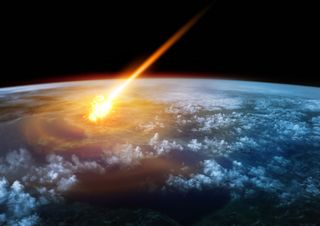Falling Fireballs Crashed in Chile Last Week. They Weren't Meteorites, Experts Say.
Chilean officials are investigating a curious collection of burning objects that fell onto parts of the country last week.

Goodness gracious! Great balls of fire rained from the sky in Chile last week, and officials are still trying to figure out what they were and where they came from.
One thing is certain: The mysterious burning objects were not meteors, according to news reports.
The fiery UFOs descended on Dalcahue City on the Chilean island of Chiloé on Sept. 25, CNET reported. . The tumbling objects crash-landed in seven locations, setting off fires that were promptly put out by volunteer firefighters. .
Related: 7 Things Most Often Mistaken for UFOs
Chiloé island resident Bernardita Ojeda had one fireball land on her property, where the flames ignited a few bushes, Ojeda told local news station Channel 2.
Geologists from Chile's National Geology and Mining Service soon arrived to examine the seven sites that had been scorched by the falling space stuff. While they conducted their analyses, the story spread through local news, social media and national outlets.
Chilean astronomer and astrophysicist José Maza told Chilean news network TVN that the blazing bodies were likely either meteorites or space debris that had detached from rockets or satellites, according to CNET. On Sept. 26, astronomer Jonathan McDowell of the Harvard-Smithsonian Center for Astrophysics chimed in on Twitter, saying that the falling objects were probably meteorites and that there were "no obvious space debris candidates that [he could] see."
Sign up for the Live Science daily newsletter now
Get the world’s most fascinating discoveries delivered straight to your inbox.
"But [it] sometimes takes a few days for relevant data to come in," McDowell added.
Se reporta caída de meteorito en mocopulli chiloe pic.twitter.com/7w3KGEgnlnSeptember 25, 2019
On Sept. 28, the geologists released their official assessment: None of the seven sites contained traces of meteorite. Since the mysterious objects weren't meteors, logic dictates that they must have been wayward space junk, but officials said they'll be conducting more detailed analyses of soil samples collected from the singed sites to make sure, according to CNET. The geologists will release their results later this month. Only time will tell what exactly fell from the heavens on that unusual September evening.
- Crash! 10 Biggest Impact Craters on Earth
- In Photos: The Impact Craters of North America
- Fallen Stars: A Gallery of Famous Meteorites
Originally published on Live Science.


Nicoletta Lanese is the health channel editor at Live Science and was previously a news editor and staff writer at the site. She holds a graduate certificate in science communication from UC Santa Cruz and degrees in neuroscience and dance from the University of Florida. Her work has appeared in The Scientist, Science News, the Mercury News, Mongabay and Stanford Medicine Magazine, among other outlets. Based in NYC, she also remains heavily involved in dance and performs in local choreographers' work.
